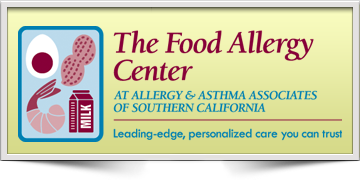What Patients Need To Know About Coronavirus
Currently, all offices are open and operating Monday through Friday. Late night shot room hours have been discontinued until further notice.
Is it okay to keep my appointment?
Yes. Our team is taking extra precautions to protect those in our waiting rooms and clinic area. If you have an appointment and no fever, then it is safe to keep your appointment.
Is it okay to get my allergy shot?
Yes. As long as you do not have a fever or have not had a fever, it is safe to get an allergy shot. Our shot rooms are open and taking additional steps to ensure you can safely continue your shot schedule.
TELEHEALTH NOW AVAILABLE
If you are an established patient we can meet many of your needs through our telehealth and telemedicine services. Please call 949-364-2900 for an appointment NOW.
We at Allergy and Asthma Associates of Southern California are dedicated to doing our part to prevent the spread of the corona virus as well as provide our patients the care that they need. To that end we have instituted the following procedures to protect both patients and staff:
Social Distancing: In our waiting rooms, we have changed and limited our seating to meet the social distancing standard of 6 feet.
- Shot patients, after receiving your shot, we ask that you wait for 20 minutes in the waiting room as far from other waiting patients as the situation allows.
- We are limiting patients to one guest (i.e. parent, guardian, partner) present for any appointments or allergy shot visits. All other visitors will need to wait in the car.
- The only exception will be if siblings have an appointment scheduled at the same time (or near the same time) – in this instance, siblings can be in the same room with one parent or guardian.
Cleaning: Our team has begun taking additional cleaning measures multiple times a day in the lobbies and shot rooms. We will also remove all toys.
Screening: Additional screening questions will be asked when making an appointment about travel and symptoms. Our check-in staff will also screen patients for fever upon arrival.
AAASC Fever Policy:
During this time, if you or anyone in your household have a fever or have had a fever, body aches, or chills within the last 14 days, we will ask that you reschedule your appointment or postpone your shot.
If you have an appointment, please call to reschedule. Allergy shot patients should not get an allergy shot if you have a fever; we recommend waiting until you are fever free for two weeks before continuing your shot schedule.If you have a fever with a cough or body aches, please call your primary care physician or an urgent care center for further instructions.
Your health is our top priority.
We will continue to monitor this situation and to update you as any changes occur over the coming weeks. If you have any questions or concerns, please call our offices. Below is additional information on Coronavirus.
Coronavirus (COVID-19) Facts:
- It is spread through coughing and sneezing, as well as close personal contact.
- Symptoms appear 2-14 days after coming in contact with the virus.
According to the Centers for Disease Control (CDC), COVID-19 symptoms can include:
- Fever
- Cough
- Shortness of breath
What if I think I am sick?
Call your primary care provider or an urgent care center if you develop symptoms and you have been in close contact with a person known to have COVID-19, or you have recently traveled from an area with ongoing spread of COVID-19.
Please know that not all patients with COVID-19 require hospital admission. Those without respiratory complications can self-isolate, but should seek medical attention if their illness worsens. Patients who are at risk for complications should be admitted to the hospital under appropriate isolation precautions.
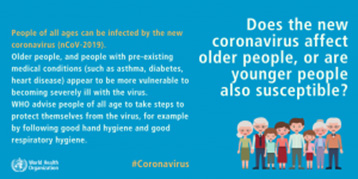
Image from WHO
Who is at risk?
According to the World Health Organization (WHO), the highest risk groups include:
- People caring for someone who is ill with coronavirus
- People over age 60
- People with chronic medical conditions such as: High blood pressure
- Heart disease
- Diabetes
- COPD
- Asthma
If you have an appointment but have or have had a fever please call to reschedule or, if you are due an allergy shot, please postpone your shot. Due to the greater risk to our respiratory disease patients, we ask that patients are fever free for two weeks before entering our waiting rooms.
Asthma and COVID-19
There is an increased risk for those with asthma or respiratory diseases to be vulnerable to COVID-19, however, the precaution guidance is the same as the flu:
- Make sure you and your children have received the flu vaccine.
- Take daily asthma medicines to keep your asthma under control.
- For those who do get sick, call your doctor, and follow your Asthma Action Plan.
How can you avoid getting COVID-19 and other respiratory infections?
- Wash your hands often with soap and warm water for 20 to 30 seconds, always after coughing or sneezing.
- If you don’t have access to running water, use an alcohol-based hand cleanser that is at least 60% alcohol.
- Don’t touch your eyes, nose, or mouth.
- Stay away from people who are sick.
- Don’t share makeup, food, dishes, or eating utensils.
If you think you were exposed to the COVID-19, contact your primary care provider to discuss your symptoms and travel history.
Reminder About the Flu
Influenza is still active.
In the US, influenza activity is still high. We encourage everyone to get the flu vaccine yearly and this year is no different. The flu is known to worsen asthma and is still the biggest threat to asthmatics and patients with COPD.
Learn about Influenza and Respiratory Diseases.
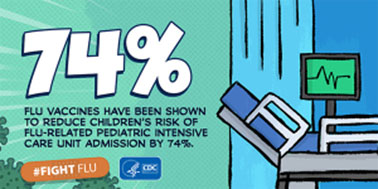
Image from the CDC
The Differences Between Coronavirus, Flu, And Allergies:
| CORONAVIRUS | FLU | ALLERGIES |
|---|---|---|
| Main Symptoms:
Fever Cough Shortness of breath |
Main Symptoms:
Fever Headaches Body Aches Fatigue and exhaustion |
Main Symptoms:
Sinus Congestion Runny Nose Post Nasal Drip Sneezing Coughing Itchy or Watery Eyes |
HOW TO PROTECT YOURSELF
Know How it Spreads
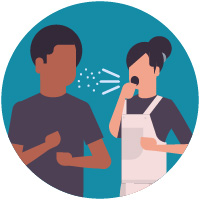
- There is currently no vaccine to prevent coronavirus disease 2019 (COVID-19).
- The best way to prevent illness is to avoid being exposed to this virus.
- The virus is thought to spread mainly from person-to-person.
- Between people who are in close contact with one another (within about 6 feet).
- Through respiratory droplets produced when an infected person coughs or sneezes.
- These droplets can land in the mouths or noses of people who are nearby or possibly be inhaled into the lungs.
Take steps to protect yourself
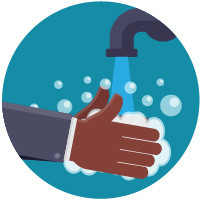
Clean your hands often
- Wash your hands often with soap and water for at least 20 seconds especially after you have been in a public place, or after blowing your nose, coughing, or sneezing.
- If soap and water are not readily available, use a hand sanitizer that contains at least 60% alcohol. Cover all surfaces of your hands and rub them together until they feel dry.
- Avoid touching your eyes, nose, and mouth with unwashed hands.
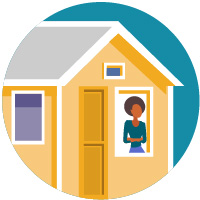
Avoid close contact
- Avoid close contact with people who are sick.
- Put distance between yourself and other people if COVID-19 is spreading in your community. This is especially important for people who are at higher risk of getting very sick.
Take steps to protect others
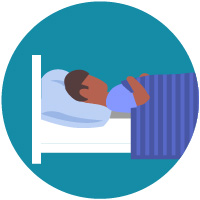
Stay home if you’re sick
- Stay home if you are sick, except to get medical care. Learn what to do if you are sick.
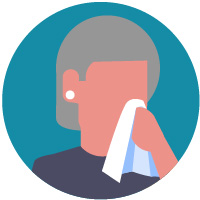
Cover coughs and sneezes
- Cover your mouth and nose with a tissue when you cough or sneeze or use the inside of your elbow.
- Throw used tissues in the trash.
- Immediately wash your hands with soap and water for at least 20 seconds. If soap and water are not readily available, clean your hands with a hand sanitizer that contains at least 60% alcohol.
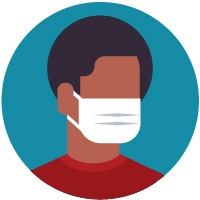
Wear a facemask if you are sick
- If you are sick: You should wear a facemask when you are around other people (e.g., sharing a room or vehicle) and before you enter a healthcare provider’s office. If you are not able to wear a facemask (for example, because it causes trouble breathing), then you should do your best to cover your coughs and sneezes, and people who are caring for you should wear a facemask if they enter your room. Learn what to do if you are sick.
- If you are NOT sick: You do not need to wear a facemask unless you are caring for someone who is sick (and they are not able to wear a facemask). Facemasks may be in short supply and they should be saved for caregivers.
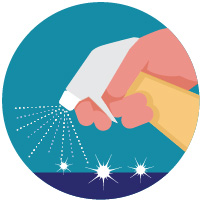
Clean and disinfect
- Clean AND disinfect frequently touched surfaces daily. This includes tables, doorknobs, light switches, countertops, handles, desks, phones, keyboards, toilets, faucets, and sinks.
- If surfaces are dirty, clean them: Use detergent or soap and water prior to disinfection.
To disinfect:
Most common EPA-registered household disinfectants will work. Use disinfectants appropriate for the surface.
Options include:
Diluting your household bleach.
To make a bleach solution, mix:
5 tablespoons (1/3rd cup) bleach per gallon of water
OR
4 teaspoons bleach per quart of water
Follow manufacturer’s instructions for application and proper ventilation. Check to ensure the product is not past its expiration date. Never mix household bleach with ammonia or any other cleanser. Unexpired household bleach will be effective against coronaviruses when properly diluted.
Alcohol solutions.
Ensure solution has at least 70% alcohol.
Other common EPA-registered household disinfectants.
Products with EPA-approved emerging viral pathogens claims are expected to be effective against COVID-19 based on data for harder to kill viruses. Follow the manufacturer’s instructions for all cleaning and disinfection products (e.g., concentration, application method and contact time, etc.).





